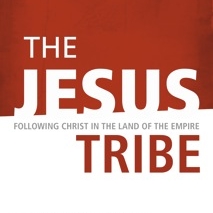The following is an except from The Jesus Tribe, by Ronnie McBrayer, available today from Smyth and Helwys Publishers.
 When that little group of Separatists left England for the New World in a little boat called the Mayflower, they landed at Plymouth Rock in a territory that would eventually become known as the Massachusetts Bay Colony. These Pilgrims, in their simple black and white outfits and familiar muzzle-loader rifles, left the comforts of home for religious freedom.
When that little group of Separatists left England for the New World in a little boat called the Mayflower, they landed at Plymouth Rock in a territory that would eventually become known as the Massachusetts Bay Colony. These Pilgrims, in their simple black and white outfits and familiar muzzle-loader rifles, left the comforts of home for religious freedom.
They had been oppressed and persecuted by the state church and, looking for much needed relief, set out to create a type of religious retreat and sanctuary. The Pilgrims were not very successful and a decade later, under a new charter, they were replaced by the Puritans. The Puritans were governed by a man who continues to have influence on the New World, Governor John Winthrop.
Winthrop claimed that God had given the Puritans this new land in order to purify Christianity, to save this continent from being wasted, and to serve as an example to the Old World for building a model society. John Winthrop delivered his most famous sermon to this end, before he even set foot on North American soil. Just off of the beach on the boat that had brought the Puritans to their new home, he preached a sermon entitled, “A Model of Christian Charity,” delivered in 1630.
A portion of that sermon reads: “The Lord will be our God and will command a blessing upon us in all our ways…He shall make us a praise and glory…We shall be as a City upon a Hill, the eyes of all people are upon us. Keep his commandments and his laws that the Lord our God may bless us in the land we go to possess.”
This high idealism that a human nation, united with religious fervor, can serve the grand and glorious intentions of God has been written into this nation’s history and psyche. That phrase, “city on a hill” or “shining light” has been used to describe the hopes and dreams for America by everyone from John Adams and Abraham Lincoln to John Kennedy and Ronald Reagan – but these words have been terribly misappropriated.
“City on a hill” language is verbiage that belongs in the realm of faith, to followers of Jesus, to disciples who are on the path into the Kingdom of God. No government, country, or Empire can ever serve as the light of the world. Any earthly nation claiming otherwise has plagiarized the words of Jesus, attempting to use human power to become what can only be born into the world by the power of God.
Many Christians in the United States have been operating under the illusion, from John Winthrop forward, that this is a Christian nation. No such entity exists. Just because we live in a nation that treats people of faith with some respect and allows us to pursue our personal ambitions, does not mean that the power-seeking Empire and the self-sacrificing way of Jesus are compatible.
Eugene Peterson makes this point eloquently clear. He says the North American church conspicuously embraces the way of the Empire while living “in Jesus’ name.” The church, too often, he says, “replaces the Jesus way with the American way. Yes, the American way works, sometimes magnificently, in achieving grandly conceived ends. Wars are fought, wealth is accumulated, elections are won, and victories posted. But the means by which those ends are achieved leaves a lot to be desired.”
So with apologies to John Winthrop, do not expect government – any government – to be the light of the world, shining as a City on a Hill. Do not expect this from your employer, a corporation into which you invest, a social service organization to which you belong, or a charity to which you give or volunteer. Expect great and noble things from these other organizations – even demand it – but do not expect more than these can give.
We might wish things were different, that the American Empire was our partner in advancing the Kingdom of God, but it is not. It can’t be. All Empires belong to this dog-eat-dog world of power and power-seeking, even the Empire begun with a sermon off the Massachusetts shore.